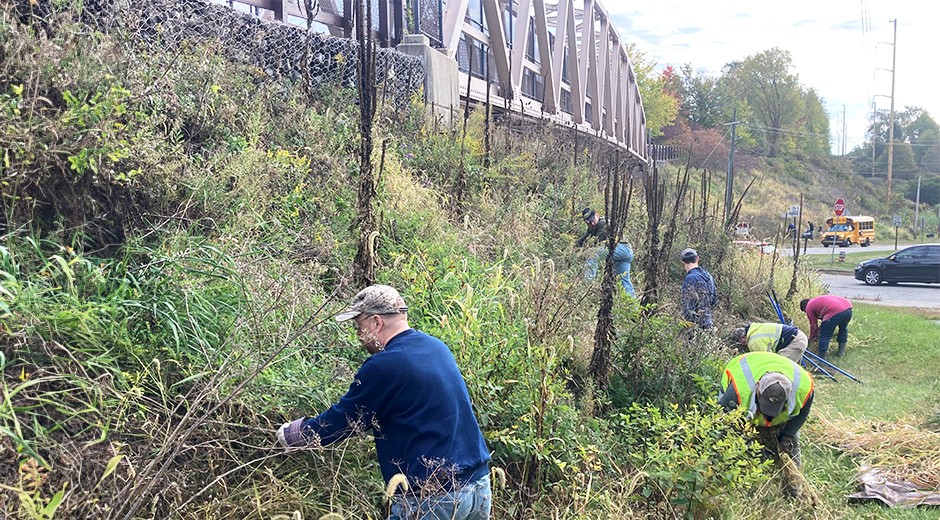West Penn Power Green Team Tackles Space Invaders
The West Penn Power Green Team recently took on a particularly troublesome invasive plant that was endangering native pollinator plants on a steep bank along the popular Montour Trail, near the Clifton Road bridge in Bethel Park, Pennsylvania.
West Penn Power forestry specialist Marie Maiuro called up the PlantNet plant identifier app on her smartphone, pointed it at a stumpy plant and confirmed her suspicion: dreaded wild parsnip capable of growing five feet tall with lacey yellow flowers.
“I was out here in the spring, and I thought, ‘Holy Cow! Where did all that stuff come from?’ Invasive plants spread fast. They take over areas and displace native species which harms the ecosystem. They are aggressive and very difficult to eradicate,” said Maiuro.
Maiuro gathered her fellow Green Teamers – employees who volunteer their time and talents to benefit the environment – and warned them to avoid skin contact with the noxious weed. The sap of wild parsnip contains furanocoumarins, a toxic, rash-inducing chemical that makes the skin super sensitive to ultraviolet radiation. Severe blisters and burns bad enough to leave permanent scars can develop within 24 hours of exposure to sunlight, which triggers a chemical reaction.
Armed with shovels, garden rakes and hedge clippers, the team worked to vanquish the botanical invaders and protect the pollinators. Spread across the bank, a dozen Green Teamers toiled for hours, yanking out grass and digging up invasive weeds. They took care not to shake dry weed stalks to prevent dislodging more seeds.
View photos of the Green Team cleaning up the pollinator garden on the company’s Flikr page.
The wild parsnip didn’t frighten everyone.
“I’m pretty used to getting in the muck. I love to volunteer, and I consider myself an environmentalist,” said Jakob Radovic, a FirstEnergy forestry technician and Green Team member.
After removing the invasive plants, the volunteers infused new life into the bank, planting rosinweed, a pollinator well-suited for poor rocky soil. The Audubon Society donated the rosinweed, which produces yellow, daisy-like flowers, a favorite of solitary bees. After clearing weeds, West Penn Power employee Bob Telegraphis probed the dirt with his spade for the rare soft spot to tuck in the rosinweed.
“It’s good to do something for the community. When we drive over this way, I can tell my wife, ‘Here’s where I pulled all the weeds,’” he said.
A Companywide Environmental Initiative
The work to clear the bank of invasive plants and add more pollinator plants is part of an initiative from West Penn Power’s parent company, FirstEnergy, to develop 225 acres of pollinator habitat across its service territory by 2025. The initiative includes creating new habitat in transmission right of ways, at the company’s utility substation properties and at parks and nature preserves. Learn more about FirstEnergy’s environmental and corporate responsibility efforts to build a brighter and more sustainable future at www.fecorporateresponsibility.com.
Work along the Montour Trail is one of the projects undertaken as part of the initiative. In 2021, company foresters planted the right-of-way beneath the West Penn Power transmission line near the trail with a special pollinator seed mix. The Audubon Society of Western Pennsylvania donated the seed blend to establish a plant community supportive of Monarch butterflies, bees and other pollinators. The poison hemlock, wild parsnip and foxtail grass that Maiuro and the Green Team identified had engulfed the delicate purple asters, bee balm, brown-eyed susan, poised to displace the pollinators.
“If you let things go in these wild spaces, they start to devolve. It’s important to maintain and curate these areas to protect native plants and encourage more flowers,” said Tim Byan, a land steward for the Audubon Society of Western Pennsylvania.

